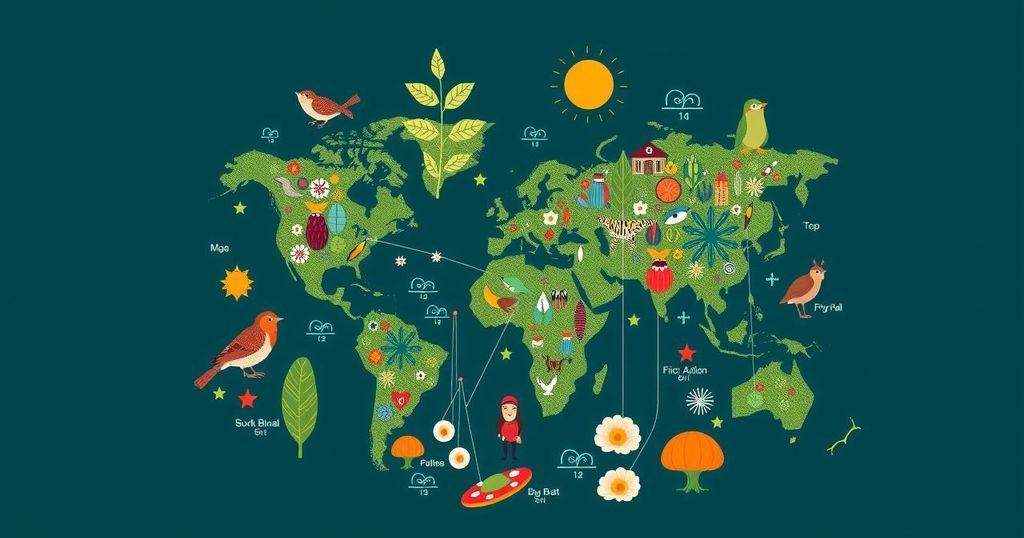The 16th Conference of the Parties (COP16) to the Convention on Biological Diversity (CBD) is scheduled from October 21 to November 1, 2024, in Cali, Colombia. The International Fund for Animal Welfare (IFAW) is advocating for international cooperation to address the interlinked challenges of biodiversity loss and climate change. The significance of marine biodiversity protection and the integration of wildlife conservation into climate strategies are highlighted as critical areas of focus. IFAW will host a side event on October 24 to discuss the role of wildlife in combating climate change.
As global leaders convene for the 16th Conference of the Parties (COP16) to the Convention on Biological Diversity (CBD) from October 21 to November 1, 2024, in Cali, Colombia, the International Fund for Animal Welfare (IFAW) has called for enhanced international collaboration to combat the dual crises of biodiversity loss and climate change. Matt Collis, IFAW’s Senior Director of Policy, emphasized the necessity of addressing these challenges in tandem, stating, “We can’t solve either the climate crisis or biodiversity loss without addressing the other.” He views COP16 as a crucial moment for aligning national and global strategies to preserve biodiversity while addressing climate change. Being the first of the Rio Convention COPs in 2024, COP16 is uniquely positioned to influence subsequent international environmental discussions and actions. The 2023 COP28 Joint Statement highlights the need for a unified strategy, and IFAW urges the participating nations to embody these commitments within the outcomes of COP16, including the anticipated Cali Declaration. Particular attention must be paid to marine and coastal biodiversity, which plays a vital role in both supporting wildlife and regulating the Earth’s climate through carbon absorption and weather stabilization. Despite their critical functions, these ecosystems face escalating threats from human activities and climate change. Mr. Collis remarked, “Healthy oceans are the foundation of a healthy planet. They absorb carbon, mitigate climate impacts, and support rich biodiversity.” He advocates for the prioritization of marine ecosystem protection at COP16 to ensure their continued resilience amidst growing climate pressures. Mr. Collis also expressed optimism regarding COP16, stating, “Time is running out to tackle the intertwined crises of biodiversity loss and climate change, but COP16 offers hope. By ensuring that biodiversity and climate efforts are aligned at every level, we can make meaningful progress. The future of our planet depends on it.” Additionally, IFAW will host a side event titled “Leveraging wildlife conservation and rewilding to supercharge climate mitigation and adaptation” on October 24, designed to explore the role of wildlife in combating climate change and to unveil new guidelines assisting governments in integrating wildlife conservation into climate action plans. Those seeking further information or wishing to schedule interviews with IFAW experts in Cali may reach out to Stacey Hedman at shedman@ifaw.org or by phone at +1 508 737 2558. Additional details and the agenda for CBD COP16 can be accessed through the CBD website.
The upcoming COP16 represents a pivotal moment in the global effort to combat biodiversity loss and climate change. The interconnectedness of these two key environmental issues necessitates a unified response from nations worldwide. It is essential for governments to elevate these challenges and ensure that collaborative actions for protection and sustainability are consolidated. The significance of marine ecosystems within this framework cannot be overlooked, as they contribute fundamentally to both ecological health and climate stability. Observations and commitments from previous COPs, such as the 2023 COP28 Joint Statement, highlight the increasing consensus regarding the need for integrated environmental strategies. This conference will serve as a critical launch pad for subsequent environmental negotiations, notably the UNFCCC COP30 slated for 2025. National plans will require updates, emphasizing the urgency for countries to adopt comprehensive strategies addressing climate and biodiversity issues simultaneously.
In summary, COP16 offers a vital opportunity for international cooperation on the pressing crises of biodiversity loss and climate change. By aligning efforts at both national and global levels, leaders can lay a foundation for successful environmental governance in the future. The emphasis on protecting marine ecosystems, alongside the call for integrated wildlife conservation strategies, underlines the holistic approach necessary for effective climate action. The outcomes of COP16 will be instrumental in shaping subsequent negotiations and commitments toward a sustainable and resilient planet.
Original Source: www.ifaw.org






